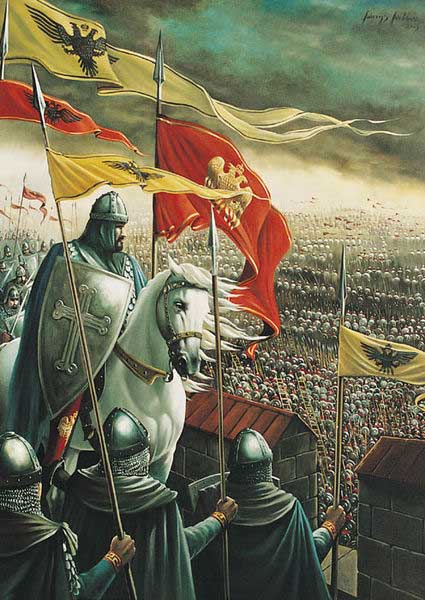Prolugue
Prologue
Constantine XI, the last Byzantine Emperor at the battlements, dawn of the 29th May of 1453
1453. That year which was to live in infamy as the year that Constantinople fell, passed amidst an atmosphere of tension and fear. The mighty host encamped outside the city's triple walls had invested in the seige for many months. As the city looked out over it's walls, it saw it's end approach. Where it had once beheld triumphs, wealth, and riches beyond imagination, there now stood it's would be conquerors. The army of Sultan Mehmet II.
It was dawn. The tired men of the night watch stared at their beseigers. The bombardment had paused. There had been little action the past night, but there was now a great flurry of activity in the enemy camp. By noon, the purpose of this activity became apparant. They were leaving! Over the next few days, men and material streamed away from the seige, leaving a small covering force. The reason for this sudden change was not apparant until later.
The Ottoman Sultan ruled an empire that included most of the Balkans and Asia Minor. To the south and east, however, lay two other powerful Islamic states, the Safavid dynasty in Persia and the Mamluks in Egypt.
It appeared that during the seige, word had reached the Sultan that the two other rival dynasties had made common cause, and that a large Safavid force was approaching his domains from the southeast while a Mamluk force advanced from the south. The Sultan's assessment was logical. The threat was substantial enough to endanger his empire. It demanded his immediate attention. Constantinople could wait, a national threat could not. He headed east to muster his defence, issuing Constantine XI the traditional Koranic terms: to pay a head tax and land tax; as well as to surrender three fifths of the state's property to the Ottoman Empire. In return, Constantine could continue to rule his city, but had to regard the Sultan as his lord.
Constantine stared at the messenger when he came, not believing his luck. He had been preparing himself for the end in the days and weeks before. To be given the chance to be a vassal was beyond belief. He eagerly accepted the second chance, kissing the messenger's feet and proclaiming his loyalty to his new Sultan. Inwardly, he vowed that this second chance would not be wasted. He would make the most of it. He would push his people to the hilt. He would lead the Byzantine Empire to a rebirth, a renewal, a revival; The Byzantine Renaissance.



